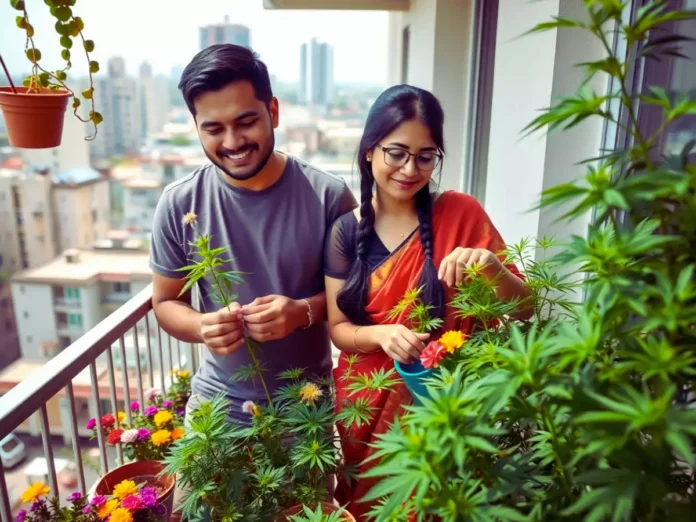In a peculiar case of social media turning detective, a Bengaluru couple was arrested after police discovered marijuana plants growing in flower pots on their balcony. The couple, identified as K. Sagar Gurung (37) and Urmila Kumari (38), originally from Sikkim, runs a fast-food eatery on the ground floor of their apartment building in MSR Nagar. Their small-scale weed cultivation came to light after Urmila posted pictures and videos of her balcony plants on Facebook, inadvertently revealing her illegal ganja plantation amidst decorative plants.
Sadashivanagar police launched an investigation after being tipped off by one of Urmila’s Facebook followers, who spotted the ganja plants in her posts and alerted the authorities. According to sources, the couple’s initial attempt to present their “home decor” collection on social media quickly unraveled as police descended on their residence.
The Arrest and Evidence Collection.
When officers arrived, they reportedly found signs of an attempt to dispose of the plants. A relative had allegedly warned Urmila of the police visit, giving her time to uproot the ganja plants and discard them in a dustbin. However, officers discovered residual traces of marijuana in the soil, along with a few lingering leaves still in the pots. The police also recovered around 54 grams of ganja from the premises.
Further investigation revealed that the couple had indeed been cultivating marijuana with the intent to sell, a fact that emerged through questioning. Initially, Urmila denied responsibility for the social media post, but the police were able to confirm that the videos and photos showcasing the plants had been posted on her Facebook account on October 18. The couple’s mobile phones were seized as part of the investigation to determine whether they were involved in additional activities beyond growing for personal use.

Action Taken by Police and Recent Drug Busts in Bengaluru.
Following the confession, police filed a case against the couple under the Narcotic Drugs and Psychotropic Substances (NDPS) Act, which penalizes the possession and cultivation of cannabis. The Gurungs, however, were later released on station bail as the case awaits further legal proceedings. This incident highlights a broader crackdown on drug activities across Bengaluru, especially in light of recent operations by the Central Crime Branch (CCB) Narcotics Control Unit.
In a separate, high-profile bust, the CCB Narcotics Unit intercepted a drug haul worth over ₹21.17 crore at Bengaluru’s Foreign Post Office, uncovering 606 parcels containing various narcotics. The intercepted drugs, including hydro ganja, LSD, MDMA crystals, ecstasy tablets, heroin, cocaine, amphetamine, charas, and ganja oil, were smuggled from international locations such as the US, UK, Belgium, Thailand, and the Netherlands. This massive haul, discovered with the aid of a canine squad, underscores the ongoing efforts by Bengaluru’s law enforcement to curb the city’s growing drug distribution networks.
Social Media’s Role in Revealing Criminal Activity.
In the case of the Gurungs, social media played an unexpected role in their arrest. Urmila’s post—intended as a casual showcase of her gardening efforts—was enough to catch the attention of a follower, highlighting the potent and often inadvertent role of social platforms in exposing private activities. The ability of social media to reach a broad audience with minimal effort has made it a double-edged sword, especially when it comes to sharing personal life details. For some, a simple post may be seen as a form of self-expression or trend-following, but for others, it becomes inadvertent self-incrimination.
Platforms like Facebook, Instagram, and Snapchat, with their pervasive presence, have inadvertently enabled law enforcement agencies to spot illegal activities that might otherwise remain hidden. In an era where online privacy is continuously eroded, users’ need for online validation can lead to unintended consequences, as seen in this case.

The Growing Trend of Marijuana Cultivation Among Young Urbanites.
The Gurungs’ arrest also touches upon a larger trend in urban India, where growing marijuana at home is increasingly popular among young adults. For some, cultivating cannabis in private spaces is seen as a relatively low-risk endeavor, spurred by the rising interest in indoor gardening and exotic plant collections. Many consider small-scale weed cultivation as a symbol of modern lifestyle experimentation and self-sufficiency, often inspired by online content that romanticizes such ventures.
The increasing accessibility of cannabis seeds and online guides on marijuana cultivation, along with perceived leniency, has added to the trend. But the allure of cultivating marijuana is deceptive, as even small quantities of the plant fall under strict drug regulations. For individuals tempted by this trend, the Gurungs’ case serves as a stark reminder of the legal ramifications. This incident points to a growing need for awareness about the severe consequences associated with seemingly minor drug-related activities, particularly among youth who may see such practices as harmless or trendy.
In a rapidly changing social landscape where private actions are increasingly public, the intersection of online influence and personal accountability continues to shape unexpected outcomes, pushing Bengaluru’s authorities to remain vigilant in their efforts against drug-related crimes.

